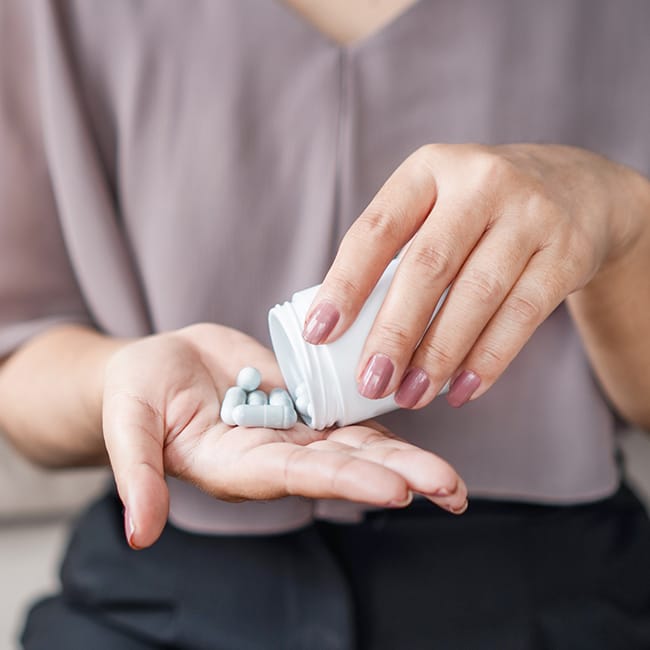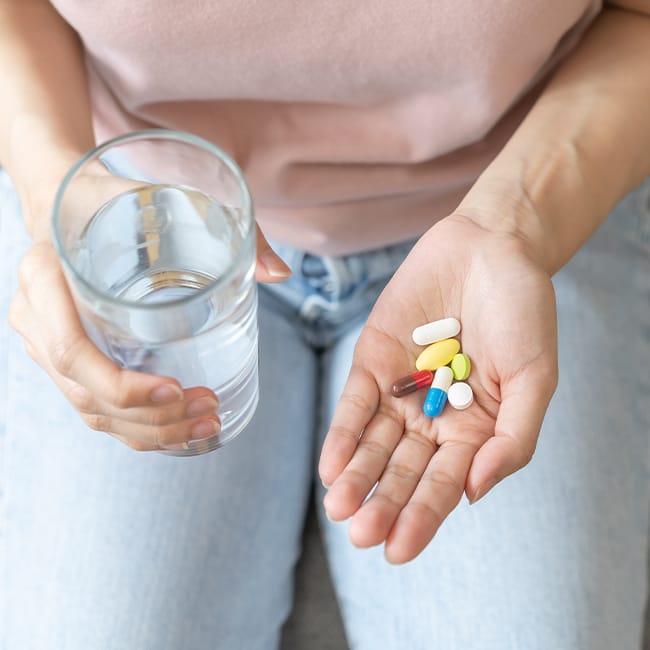This post has been updated since its original publish date to include more beverages and expert insight.
If you frequently suffer from inflammation, it’s important to reevaluate your diet—including the beverages that you consume daily—to determine what triggers this for you. Many of us sip on inflammatory drinks without even realizing their power to also cause bloating, cramps, weight gain, indigestion, and more.
With that said, we checked in with health and nutrition experts to learn more about some of the worst drinks anyone who commonly experiences inflammation (and who wants to prevent weight gain) should avoid, and why. They told us that soda, energy drinks, sweet tea, fruit juice, and frozen coffee beverages are among the biggest culprits. Read on for tips, suggestions and insight from Nataly Komova, RD; registered dietitian and fitness expert, Sara Chatfield, MPH, RDN; registered dietitian and nutritionist and Dana Ellis Hunnes; and nutritionists Dr. Daryl Gioffre and Heather Hanks.


1. Soda
While replacing any of your favorite high-sugar or high-calorie beverages with water is the optimal solution for inflammation and the best way to go, that may be difficult to do at first. If you often sip on sodas, colas or other similarly fizzy and sugary drinks, Hunnes suggests opting for kombucha instead, as it is a probiotic-rich, anti-inflammatory option. "The probiotics and the antioxidants [in kombucha] are anti-inflammatory and can aid in promoting GI health by helping to colonize the GI tract with healthy bacteria," she explains. Komova adds that soda in particular is one of the most inflammatory drinks out there, as it "can also cause insulin resistance and raise cholesterol levels, slowing weight reduction." Overall, preventing inflammation will only help your overall health (and/or) weight loss goals, as Komova says, since “inflammation can impact weight loss negatively as it alters leptin responses in the body.”
Changing these hormones impairs the brain's function in signaling the body that you have eaten to your maximum. “Leptin resistance triggers weight gain as individuals tend to consume more calories unknowingly.” The antioxidants in kombucha can not only help prevent this and aid your digestion, but also help prevent inflammation, Hunnes notes, promoting the health of the probiotics as well. “It is also thought that kombucha can slow down the digestion of carbohydrates by, likely in-part, because of the healthy anti-inflammation effects it has on the GI tract,” Hunnes says.

2. Energy Drinks
If you like to wake up with the help of an energy drink, this will only exacerbate your inflammatory symptoms, Komova says. With so much sugar, fruit-like flavors and an instant serving of caffeine, energy drinks are popular for their taste, but as Komova explains, their potential to cause inflammation is a notable concern. “I strongly advise you to keep these drinks from your weight loss diet routines,” Komova says, referring to energy drinks, the common beverages containing stimulant compounds.“Most energy and sports drinks contain added sweeteners, colors, and sugars that are harmful to your health,” she continues. These artificial compounds, she adds, can cause chronic inflammation.
“The drinks contain processed sugars and artificial sweeteners that increase your risk of body inflammation, delaying your weight loss process.” If you need a boost of energy to help you wake up in the morning, Hunnes recommends drinking either plain black coffee (that contains zero calories, btw) or "lightly-sweetened" drinks with plant-based or monk fruit sweeteners that don't contain sugar.

3. Sugary Sweet Tea
Lastly, super-sweet tea is a delicious treat once in a while, but should ultimately be avoided if you're prone to inflammation, Chatfield stresses. Drinking this often leads to excess sugar consumption that can cause weight gain, she says. Sugar-sweetened beverages like sweet teas are a big culprit because “we may not think of them as being high in calories, and our bodies also don’t recognize the calories in the same way as they do those from food,” Chatfield notes. This can lead to more calorie intake later on. This, she continues, may lead to changes in fat metabolism. “There is a heightened risk of fatty liver disease, where fat builds up in the liver. Too much insulin from high sugar intake can also be detrimental to artery and heart health,” she says, noting that the drawbacks of sweet tea concern more than just inflammation.
To promote your ideal health and prevent inflammation, she recommends instead sipping on unsweetened iced tea, as this does have health benefits from its flavonoid content. Ultimately, the high sugar content of sugary sweet teas (popular teas varied from about 28-44 grams of sugar per 12 oz. serving) can quickly put you over the maximum recommended sugar intake of 24 grams per day for most women and 36 grams per day for most men. Chatfield concludes that “unsweetened iced tea is a better choice” for this reason and to prioritize and care for your digestive health.

4. Sugary Fruit Juice
Another major culprit of inflammation is sugary fruit juice, such as store-bought orange juice and apple juice. While fruit certainly makes a healthy breakfast or snack, experts warn that most of the fruit juices you'll find at the grocery store are highly processed, packed with sugar, and stripped of nutrients. "When you drink just fruit juice, the fiber is stripped away and you can consume in one small glass of orange juice the amount of sugar and fructose found in five oranges, minus all of the innate goodness in that orange," Dr. Gioffre says, noting that it's basically "glorified sugar water."
And, as we all know, all of that sugar can lead to inflammation and a range of other health issues. "Sugar induces inflammation in the body and spikes insulin levels, which is essentially a fat-storing hormone. When we reduce sugar intake, we reduce insulin levels and essentially stop the body from storing fat," Hanks explains, adding that sugar from juice also enters your bloodstream quicker than sugar from food does. If you really can't kick your juice habit, it may be worth investing in a juicer so that you can make it at home—that way, you can leave the added sugar out, and you'll know exactly what's going into your body.

5. Frozen Coffee Drinks
If you don't love the bitter taste of black coffee (although it is the healthiest option), you may enjoy a specialty drink from Starbucks from time to time. Among fan favorites is the infamous Frappuccino. Unfortunately, Komova warns that this, alongside other frozen coffee drinks, is one highly inflammatory beverage you should think twice about ordering if you want to avoid weight gain.
"Taking a cup of frozen coffee with creams and milks, especially from coffee shops, can significantly slow down metabolism and trigger weight gain," she says. In fact, these beverages can pack in as many as 1,200—say it ain't so!
If you really want some sweetness in your morning coffee, you're better off choosing natural sweeteners like monk fruit or stevia instead of choosing this calorie bomb.


























